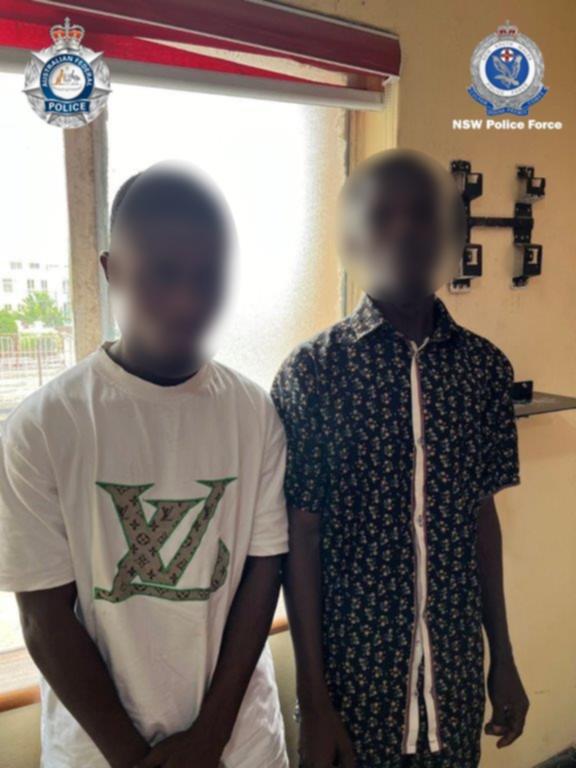Australian boy killed himself after scammers threatened to distribute nude photos in attempted ‘sextortion’
Two men from a sprawling Nigerian slum targeted the NSW teen online with what police called “high-pressure techniques” involving threats and manipulation. Hours later he was dead.

Within hours of a West African crime gang – posing online as a ‘young lady’ – sending bikini photos to an Australian high school student via multiple social media platforms, the boy had committed suicide in his bedroom.
The teenager, from New South Wales, took his own life late last year after two young men from a sprawling Nigerian slum – pretending to be a woman – threatened to share nude photos of him unless he paid them $500 in online gift cards.
When local police began investigating they discovered “horrific” messages between the boy and an unknown person, who he had been engaging with online, in the hours before his death.
Sign up to The Nightly's newsletters.
Get the first look at the digital newspaper, curated daily stories and breaking headlines delivered to your inbox.
By continuing you agree to our Terms and Privacy Policy.And that the ‘girl’ who the teenager thought he was talking to had threatened to share nude photos of the boy with his family and school friends if he did not comply with demands for payment.
Local police referred the case to the State Crime Command’s Cybercrime Squad.
Its commander, Detective Superintendent Matthew Craft, said the Nigerian men had used “high-pressure techniques” involving threats and manipulation on the teenager, while posing as a woman of European background in a state of undress.
“Our particular victim thought he was communicating with a young lady in various stages of undress,” he said.
“It started off with just bikini shots and then slowly, as the conversation progressed, there were further images exchanged.”
NSW Police have repeatedly refused to reveal which social media sites the sextortionists had used to contact the teenager to avoid “vilifying” any particular platform.
Supt Craft said the Nigerian scammers had used a “scattergun approach”, in which they had attempted to lure potential victims by posting social banter online.
“It’s about trying to make friends, get somebody to engage with you to write back to respond,” he said.
“At first it’s not sexualised. It may be a question about sport, the weather…. Something that may gather or appeal to somebody to respond back to you so they can get somebody on the hook.
“That sexualised banter then progresses from there.”
Supt Craft said the NSW teenager wasn’t specifically targeted but had merely responded to the scammer’s bait. Within seven hours, he had taken his life.
“It’s extremely tragic circumstances,” he said.
“The entire NSW Police felt somewhat saddened by what had occurred on that particular night.”
Supt Craft said Nigerian authorities had uncovered evidence on the offenders’ devices that there were other victims.
“It comes down to threats and manipulation,” he said.
“Their conversations, what they say (it) creates an environment where that young person who’s vulnerable, who’s generally on their own, is really tricked or deceived into believing their sensitive image, their ‘nude’ so to speak, will be disseminated to everybody on their social media platforms and their social media feeds.
“So that creates that heightened level of anxiety within the victim that causes them to want to pay these individuals.”
In this case, Cybercrime Squad detectives traced the accused to Nigeria, before seeking help from the Australian Federal Police to pursue them further.
Last month, five months after the teenager took his own life, Nigerian police and the AFP arrested two young men in a slum in Nigeria’s largest city, Lagos, where 25 million people live.
The men cannot be extradited to Australia so will be dealt with locally, where authorities have the power to prosecute Australian-based offences.

It is understood they will be charged over the sextortion attempt, but not the boy’s death.
An NSW police spokesperson said Nigerian authorities were still finalising the charges.
“We hope to have a clearer understanding of the criminal proceedings within the next two weeks,” she said. “We are still working with the AFP and Nigerian authorities.”
NSW Police have seen a dramatic spike in sextortion cases, which are up nearly 400 per cent in the last 18 months, largely targeting boys aged 14 upwards.
In an eerily similar case, two Nigerian men were charged in February over the sextortion of a Canadian boy who also killed himself.
After his suicide, Canadian police found that the boy had been tricked into sending explicit photos to the offender, who was posing online as a teenage girl.
The ‘girl’ then blackmailed him with threats to distribute the photos to his family and friends unless he sent the offender gift cards. The boy then took his own life.
A few months later, police in Canada identified the two suspects involved, also located in Lagos, Nigeria. With the help of multiple partners and agencies – including the FBI and AFP – the pair were arrested.
One of the men was released without charges and the other was charged with multiple offences under the Nigerian Criminal Code.
The deadly trend comes with eSafety Commissioner Julie Inman Grant telling The Nightly that big tech companies have the technology to combat sextortion but were not systematically using it.
“There is no defence for inaction by online service providers,” she said.
“They can deploy, at scale, language analysis technology to proactively flag accounts using known expressions, phrases, hashtags and syntax to entrap targets.
“Moreover, many of the profile pictures and profile names are used over and over to target victims.”
Ms Inman Grant said online service providers should be using image-detection technology that scan and flag known profile images.
“When a user is banned, there should be robust measures to prevent re-registration, and these bans should apply across the entire suite of a company’s services.”
The commissioner said the number of sexual extortion reports to her office has exploded in recent years.
“Every day, countless children and young people in English speaking countries are entrapped and manipulated by criminal networks, mainly based in West Africa,” she said.
“Sexual extortion isn’t a new online harm, but the industry has so far failed to take coordinated and systemic action to stop it.
“eSafety has powers to remove intimate or explicit content shared without consent as part of our image-based abuse scheme.
“The number of sexual extortion reports to this scheme has exploded in recent years but these are likely the tip of the iceberg as authorities estimate only one in 10 victims report this crime due to a deep sense of shame.”
Last financial year, almost 70 per cent of image-based abuse reports to e-Safety were sexual extortion.
Sexual extortion, also known as sextortion, is a form of online blackmail where someone tricks or coerces you into sending sexual images of yourself and then threatens to share the images unless you comply with their demands. Usually, these demands are for more images, payment or sexual favours.
“Men and boys were most at-risk, making up almost 90 per cent of sexual extortion reports,” Ms Inman Grant said.
“Reports to our investigators show these criminals ‘bomb’ their targets with fake social media accounts, typically on Instagram and Snapchat, using advanced social engineering tactics and tried and tested scripts.
“Frequently posing as attractive young women, they deploy a combination of charm, flirtatiousness and sexually explicit language and photos to manipulate their targets into sharing nude images or videos of themselves.
“Once that happens, the chat immediately turns menacing, with threats to share the compromising material if targets don’t pay.”
Ms Inman Grant said sextortion inflicted profound harm and distress to victims of any age.
“We’re particularly concerned about the impact on children and young people who might feel they’ve nowhere to turn and withdraw from their trusted supports,” she said.
“These criminals are practised in the art of manipulation and know how to isolate, shame and corner children.
“If your child admits they’ve been targeted, try to swallow any fear or judgement.”
Ms Inman Grant said parents don’t have to solve this problem alone and there are extensive resources available to help parents and their children at eSafety.gov.au and the AFP-led Australian Centre to Counter Child Exploitation.
AFP Commander Helen Schneider said the sextortion of children was a borderless crime.
“The partnerships between law enforcement here in Australia and around the world are vital as we work together to protect children online.”
Supt Craft urged victims to report such threats “before it goes too far”.
“We want young people to continue to report these cases, and to never be embarrassed to talk to police,” Supt Craft said.
“Sextortion is a very real crime that we can take serious action against.
“These arrests in Nigeria show just how far police are willing to go to seek justice on behalf of our young community.”
What to look out for
When talking to new people online you should be wary of:
🚩 Unsolicited friend or follow requests or random adds from people you don’t know.
🚩 Sudden sexualised questions or conversation.
🚩 Instantly receiving sexual images from a fake profile who asks for the same from you.
🚩 Getting a direct message on one app, then being asked to continue chatting on a different app.
🚩 Signs that English may be a second language.
🚩 The fake profile might say that their webcam or microphone are not working for video calls/chats.
🚩 The fake profile says that they promise to delete your content.
Need to talk to someone? Please reach out for help.
Lifeline: 13 11 14 or lifeline.org.au
Beyond Blue: 1300 22 4636 or beyondblue.org.au
Suicide Call Back Service 1300 659 467 and suicidecallbackservice.org.au
Kids Helpline: 1800 55 1800 or kidshelpline.com.au
